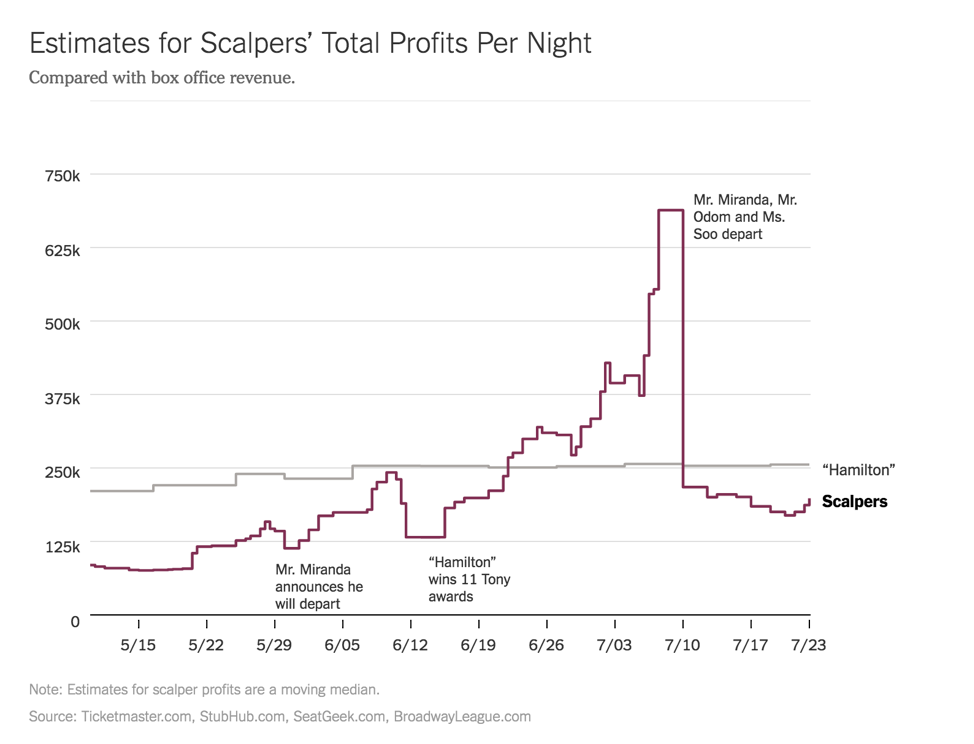Last spring, I investigated how ticket scalping became the billion-dollar industry that it is today and how it is affecting the performing arts. By discussing ticket scalping and ticket bots with both the Pittsburgh Ballet Theatre (PBT) and Ballet Austin, I found out how many areas of an arts organization, including customer service, marketing, IT, and sales, can feel the negative effects when they and their tickets are targets of these controversial online pirates.
Since I last updated readers, ticket bots have received both media and legislative attention, mostly due to the hit Broadway musical Hamilton. In early June, several original cast members, including Lin-Manuel Miranda and Daveed Diggs, took their final bows in the show within days of each other, causing a drastic increase in ticket prices on the secondary market. The spike was so significant that it made headlines. While the average face value for a Hamilton ticket sat around $190, tickets on the secondary market were about $850 in May of this year, but increased four-fold in between the Tony Awards and the beginning of July. Once Miranda announced his departure from the show at the start of July, the average median ticket price increased to a whopping $10,900.
The New York Times showed great interest in this story, and conducted real-time research to track the publicly available prices for Hamilton tickets. They concluded that ticket scalpers made more than $15 million for Miranda’s final 100 performances – and likely two thirds (over $10 million) of that was earned during the 32 performances between the Tony Awards and Miranda’s final performance. While show producers certainly made some profit off of ticket sales (an estimated $2.7 million for those same 32 shows), many feel that these online scalping agencies are unjustly taking money away from the people that actually make the show happen. In fact, in early June, Miranda publicly denounced the ticket bot industry and its impact on making the show accessible to a broader audience. Subsequently, show producers raised the face value price of tickets in an attempt to regain some of the money that they “lost” from the resale market. Raising the price of the face value assumes that scalpers have hit a ceiling as to how much they can charge for the resale of tickets, and so will re-collect at least a portion of the profits that the scalper would otherwise retain themselves. However, the strategy of raising the face value of popular tickets makes these shows even more inaccessible to the general public, putting a damper on public excitement and buzz around popular shows. Additionally, when audience members pay a higher face value, the audiences’ expectations are raised of show producers and cast themselves, simply because they are forking over more money out of their own pockets that they know is going directly to the show.
Hamilton Ticket Price Comparison (source: NYTimes.com)
As of late, both federal and state legislatures have taken special notice of this detrimental issue to the arts, entertainment, and sports sectors. New York, in particular, has spearheaded recent legislation to take criminalizing ticket bots and scalping to the next level. Although ticket scalping has been illegal in New York since 2010, along with 12 other states around the country, the state has plans to increase enforcement tactics and eventually exterminate the problem, with potential jail time and much higher fines than offenders currently face. In fact, earlier this year the New York Attorney General Eric Schneiderman released a report nearly 50 pages long that details the plethora of dynamics surrounding ticket bots and recommendations to turn the problem around for both the industries affected as well as consumers. A statement by a New York assemblyman Jeffrey Dinowitz succinctly emphasizes the major accessibility problem ticket bots pose to the public: "This unscrupulous system is detrimental to the thousands of fans out there who are just trying to see their favorite show or sports team."
This issue was taken to the national level this fall. A new bill, called the “Better Online Ticket Sales Act” (or BOTS Act) was passed just this past September by the House of Representatives and the Senate Commerce Committee, but must be approved by the full Senate and the President before it becomes a law. The overarching goal of the BOTS Act is to curtail ticket bots and make it illegal to sell tickets that were obtained through this kind of software. This would prevent sites like StubHub and Ticketmaster from selling any tickets purchased by bots.
Time will tell what happens with this pending legislation. Stay tuned for an in-depth look at how ticket bot software works and how arts organizations may be impacted in the future depending on the outcome of the passing of legislation.



